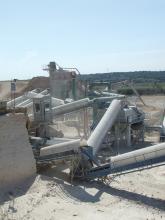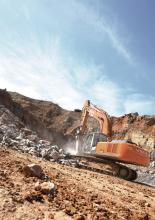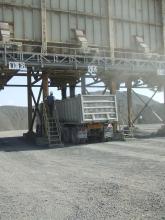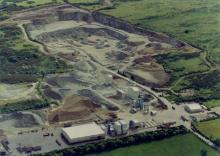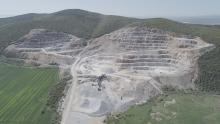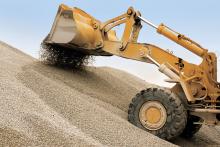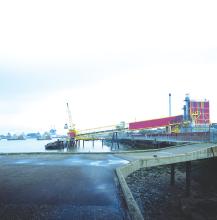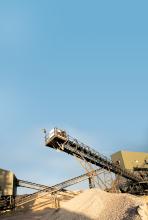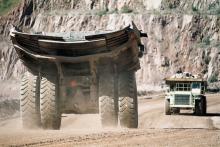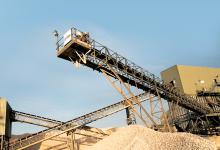
Turkey has a wealth of stone deposits and its internal aggregates consumption is expected to rise in line with increased development. Lisa Russell reports
Turkey is very lucky in terms of its geology, according to Ozgur Ozturk, who is raw materials manager at Akçansa and represents the Turkish Aggregates Producer's Association (AGÜB) at the
Unlike countries that have only hard rock, Turkey has the advantage that other materials such as magmatic and sedimentary rocks can also be found, explained Ozturk. "Most of Turkey's aggregates market involves processing of limestone material," he explains. "Despite only accounting for a small amount in total, basalt formations are also used for the region's aggregates, especially for projects that needs high quality concrete and nowadays for the top surface of asphalt roads. We have estimated that around 300million tonnes of aggregates are being produced annually in Turkey, based on 2008 data."
Production and consumption are both concentrated in the northwest and particularly in and around the Istanbul area, which accounts for between 80 and 100million tonnes a year. Output represents an average of about 4tonnes per person per year - considerably less than in more developed countries, which means the aggregates business has a promising future in the country, Ozturk claims.
The 300million tonne total includes natural sand and gravel production, though the amounts of these are small as current legislation places restrictions on river-bed extraction. Most sand has therefore to be produced by crushing and, as a result, crushed aggregates account for some 90% of the total production.
Aggregates are produced in an estimated 750 or more locations - data collected in 2008 showed about 650 for crushed rock and 120 for sand and gravel. There could also be additional small local quarries that do not show up in the national data.
"In general, the quarry business is dominated by small, local family groups," said
Some of the larger family-based ones can produce about 3 or 4million tonnes a year when the market is good, according to Ozturk. "But capacity is more than demand at the moment," he said. "The majority of quarries are middle-sized with typical capacities of about half a million tonnes.
Some international groups also have a presence. Cement, ready-mix and aggregate producer Akçansa is a joint venture of Heidelberg Cement Group and
Most of Turkey's cement producers have their own aggregate production and ready-mix plants, said Ozturk. Other international names in Turkey include
There has not been much consolidation of local quarry businesses, but Sürek expects this to change. Maden Yapi was formed in 2006 from four family-owned limestone quarries in Gebze, near Istanbul (ABE Nov/Dec 2008). "Forming the larger group has worked very well and has brought many efficiencies," said Sürek. He expects such consolidation to become more widespread where as many as 10 smaller companies may currently operate competitively in close proximity. Benefits include reduced competition and operating costs while having greater flexibility to meet changes in demand. For instance, the group is extending its range of materials through a new investment in an industrial micro process plant for mortar and tile plaster with 100,000tonnes annual capacity.
"The brunt of the world recession was felt last year," Sürek said. "But the country is still developing and so infrastructure construction is essential. One of the drivers for investment is
the target for Turkey to join the EU by 2015. Prices were very low last year with an average selling price for aggregates for concrete and asphalt at about E2 per tonne." Information from the market indicates that the global recession brought about a reduction of about 30% in production and prices last year, according to Ozturk. "Demand is now becoming a little better though is still behind values from 2007 and 2008," he said. "Current site prices vary between E2 and E4 per tonne for aggregates."
But location has a big affect on price. In particular, prices on the European side are higher than in Asia.
"The price is always at least E1 more on the European side," said Sürek. "The price is approaching E2.5 per tonne on the Asian side of Istanbul, and 3.5 for the European side. There are more quarries on the European side. Demand for aggregate and the total production is greater than on the Asian side. The plants and quarries on the Asian side are more modern with a higher capacity, but demand for aggregate is lower and competition drives the costs down." Maden Yapi's figures for 2009 were down 50% compared with 2008 but there are signs that this year is already returning to 2008 levels. Much of the local demand is for housing, with the government pursuing a strategy to increase provision. The recession effectively brought this to a halt last year. "But we have seen demand for housing increase a little bit - maybe 10% or 20%," said Sürek.
Fact File: Turkey
No. of quarries: 770
Total production: 300million tonnes
Sand and gravel: 270million tonnes
Crushed rock: 30million tonnes
Source: AGÜB 2008"This year, the quarrying and mining sectors in particular are going well and so as a result we have sold numerous excavators and wheel loaders to these customers. For next year, I believe that demand will increase again by around 10% to 15%. However, with the election approaching, there is still a need to be cautious with regard to the market." Some large infrastructure projects are also planned, including major bridge and tunnel projects and associated roadworks. "They have not started yet but they will have a positive effect," said Ozturk.
Issues such as dust emissions mean that local communities take a great interest in quarries. "Aggregates producers are under much pressure from the government and society and there is opposition to investment in expanding operations," said Ozturk.
"Recycling of construction and demolition waste is a new topic in Turkey that is just starting to be introduced. Akçansa is planning to become involved in this area as part of its environmental ambitions. We are planning to start biodiversity and quarry rehabilitation schemes. Approvals are in place and the initiatives are starting in earnest this year."
Turkey's resources, such as aggregates, all officially belong to the state. Companies have a licence to extract, but must pay a fee - similar to a tax - on the material once a year. "For aggregates, it is of the order of 4% on top of the sale," said Ozturk. "But new mining legislation is set to double this "tax" for all minerals." Local authorities and mayors are expected to be given greater control over the sector under the new regulations scheduled to come in the future. "There will more uncertainties for businesses when dealing with local authorities," said Ozturk.
Sürek doesn't welcome the change, feeling that it will be harder for local authorities to be as objective as central government. "There may be more political factors in future investment decisions,"he said.

